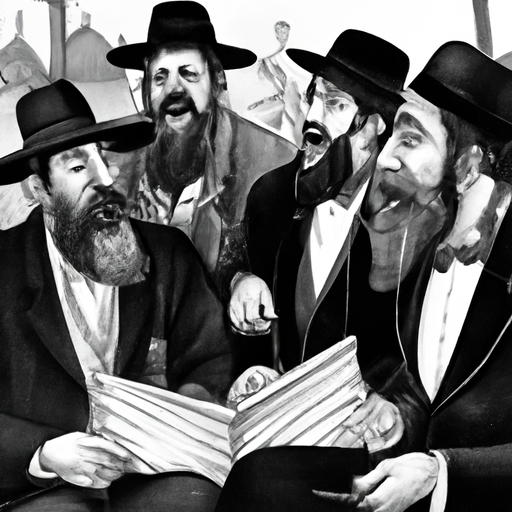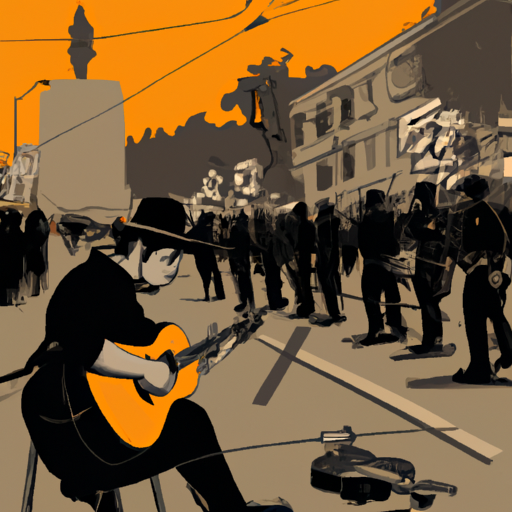Dive deep into the rich and diverse musical heritage of Israel, a land where East meets West, and ancient melodies blend with contemporary beats. Explore how this small nation has produced an array of musical styles that resonate globally, from the soulful strains of Sephardic tunes to the rousing rhythms of Israeli pop.
“Music is the universal language of mankind” – A Journey through Israel’s Diverse Musical Landscape
Israel’s diverse musical landscape is a treasure trove waiting to be explored. From the haunting melodies of traditional Jewish music to the pulsating beats of modern Israeli pop, the country’s rich musical heritage is a testament to its vibrant culture and history. The fusion of Eastern and Western influences creates a unique sound that captivates audiences around the world. Israeli music transcends language barriers and connects people on a soulful level, echoing the sentiment that “music is the universal language of mankind.” The rhythmic diversity found in Israel’s music scene reflects the country’s multicultural society, with each note telling a story of resilience, hope, and unity. Whether it’s the ancient sounds of the oud blending with contemporary electronic beats or the powerful vocals of Israeli divas carrying messages of love and peace, Israel’s music scene is a melting pot of creativity and passion. As you embark on a journey through Israel’s musical landscape, you’ll be mesmerized by the harmonious blend of tradition and innovation, history and modernity. Let the melodies of Israel’s diverse musical heritage transport you to a world where music knows no bounds and unites hearts across all borders.

A vintage black and white image of a group of Sephardic Jews singing traditional songs.
From Synagogue to Stage: How Has Traditional Music Influenced Contemporary Israeli Pop?
Traditional Jewish music has long served as a cornerstone of Israeli culture, influencing contemporary pop music in profound ways.
- 1. **Roots in Tradition**:
The melodies and rhythms of traditional Jewish music, rooted in centuries-old religious and cultural practices, have found new life in the vibrant world of Israeli pop. - 2. **Modern Interpretations**:
Artists often draw inspiration from ancient liturgical music, incorporating elements such as cantorial singing styles, traditional scales, and modalities into their contemporary compositions. - 3. **Cross-Genre Collaborations**:
Collaborations between traditional musicians and modern pop artists have led to innovative fusions, blending the old with the new to create a sound that is both nostalgic and cutting-edge.
This fusion of traditional and contemporary styles has not only enriched Israeli pop music but has also served as a bridge between generations, connecting young audiences with their cultural heritage in a fresh and exciting way. The influence of traditional Jewish music on Israeli pop is undeniable, shaping the sonic landscape of the country and infusing it with a deep sense of history and identity. As Israeli artists continue to draw inspiration from their rich musical heritage, the evolution of the country’s pop music scene promises to be a dynamic and ever-evolving journey through time and tradition.
The Sounds of Resistance: How does Music Mirror the Socio-Political Landscape of Israel?
Music has always been a powerful tool for expressing dissent and resistance, and in Israel, this is no exception.
Artists use their music to shed light on social injustices, political tensions, and the complexities of life in a region marked by conflict.
Through their lyrics, rhythms, and melodies, musicians in Israel reflect the socio-political landscape of the country, offering a unique perspective on the challenges and triumphs of its people.
From songs that call for peace and coexistence to anthems of protest and solidarity, Israeli music serves as a mirror to the diverse voices and experiences of its population.
In times of unrest and uncertainty, music becomes a unifying force, bringing people together and amplifying the voices of those who are often marginalized or silenced.
By addressing pressing social and political issues through their art, Israeli musicians not only entertain and inspire but also provoke thought and spark important conversations that have the potential to drive meaningful change.

An evocative image of an Israeli musician playing a traditional instrument against the backdrop of a protest.
Can the Emerging Genres of Music in Israel Bridge Cultural and Religious Divides?
As Israel’s music scene continues to evolve, there is a growing sense of optimism that emerging genres have the power to bridge cultural and religious divides.
Artists are blending traditional Middle Eastern sounds with modern Western influences, creating a fusion that resonates with audiences from diverse backgrounds.
By incorporating elements from various musical traditions, Israeli musicians are embracing multiculturalism and celebrating the richness of their heritage.
Through collaborations between artists of different faiths and backgrounds, music has the potential to serve as a common language that transcends religious and cultural barriers.
In a country known for its diversity and complexity, the unifying power of music is evident in the way it brings people together, fostering understanding and empathy.
As emerging genres gain popularity both within Israel and on the international stage, there is hope that music will continue to be a catalyst for dialogue, cooperation, and mutual respect among communities that have long been divided by cultural and religious differences.
עבור פרטים נוספים בנושא של Exploring the Rich Musical Heritage of Israel וmusical heritage of Israel נא לבדוק ב- israelmusic.top
The musical heritage of Israel is as diverse and dynamic as its people. Its rich tapestry of sounds, from ancient liturgical chants to modern pop anthems, serves as a testament to the country’s resilience, creativity, and unending quest for harmony. As we continue to explore new sounds and rhythms, let us always remember to tune in to the enduring melodies that connect us to our shared human experience.
